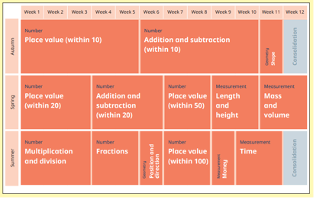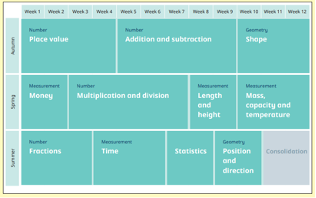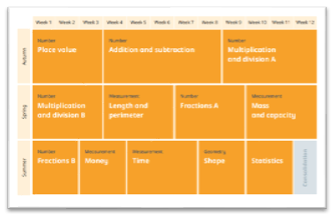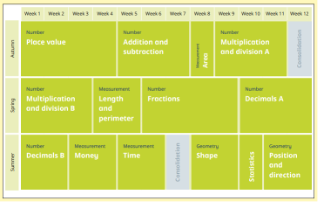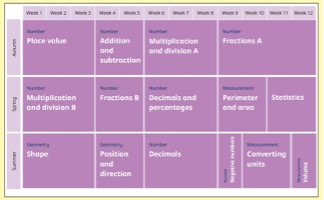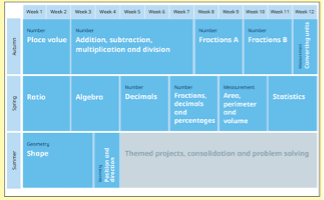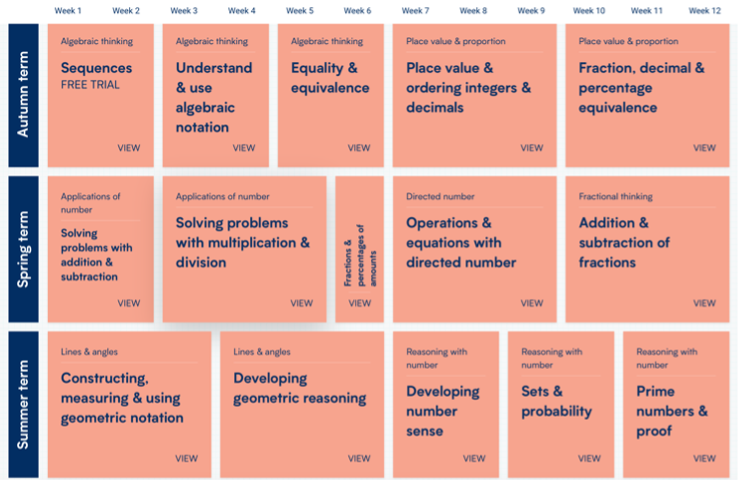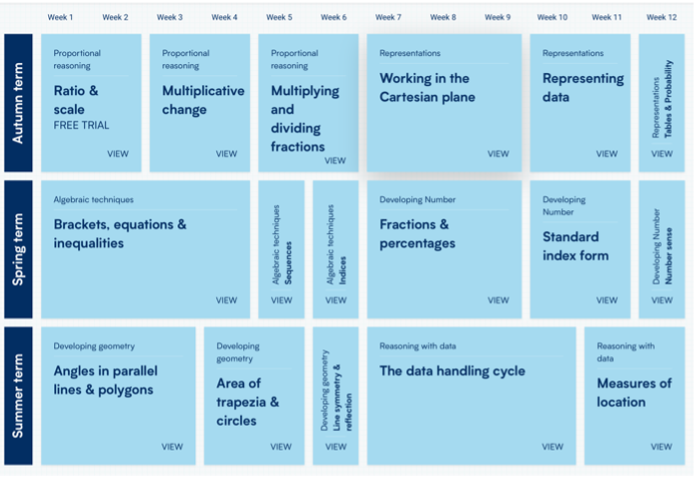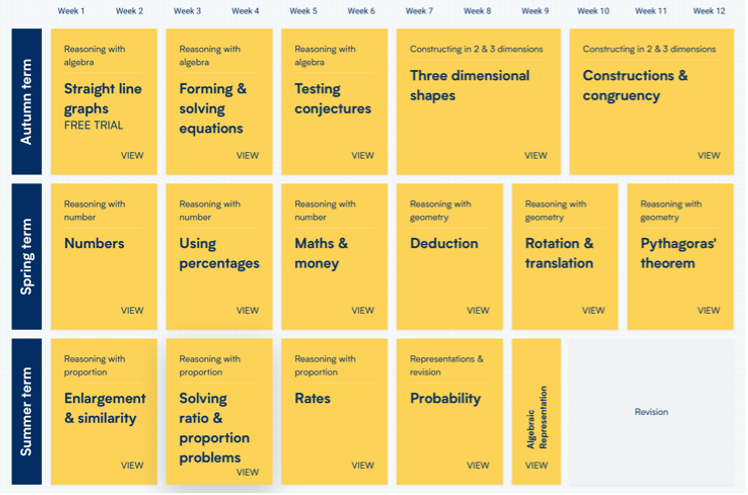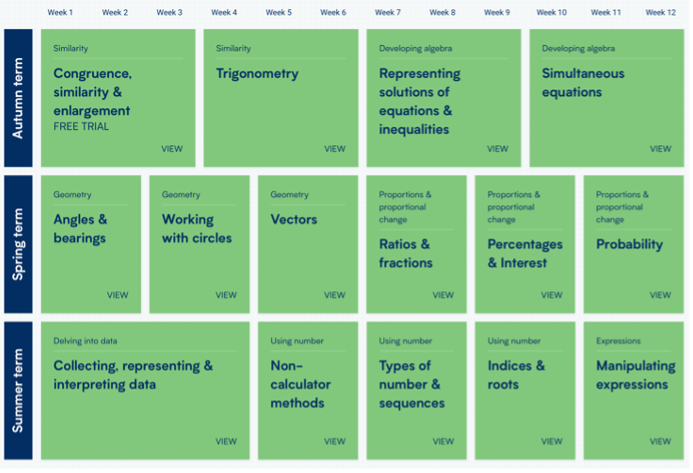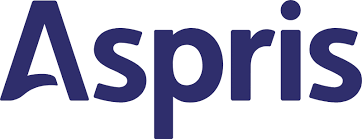Curriculum Subjects
This page contains expanding panels that explain the Intent, Implementation and Impact of our key subject areas at Al Karamah School. Please click on a subject area of interest to read about how we deliver that topic.
Al Karamah School and Training Institute PSHE Curriculum Statement of Intent
The AKS/AKTI Curriculum Statement of Intent has been carefully considered for each curriculum area to ensure the content designed meets our vison and mission at every opportunity.
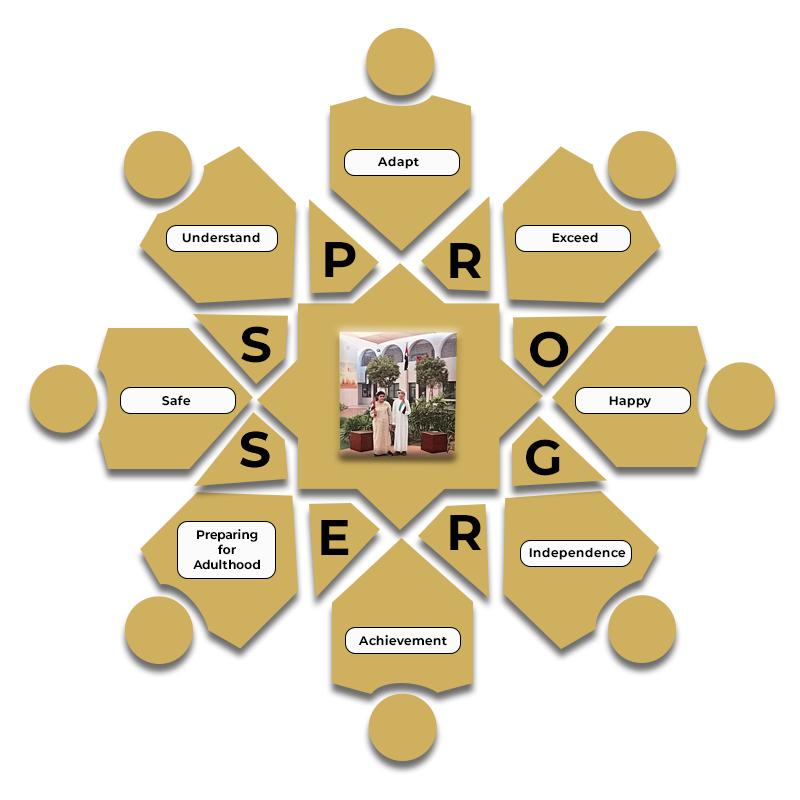
Al Karamah Vision
To strive to provide the highest quality education and care in a safe and positive environment that enables esch young person to achieve their potential
Al Karamah Mission:
Al Karamah School is creating a world of possibilities, supporting student achievement, enjoyment, and well-being through enriching, nurturing, and high-quality education.
Our Curriculum Aims
Our curriculum has the child at the centre of everything we do. We want our students to be:
- Safe and happy.
- Supported to achieve the very best outcomes
- Prepared for Adulthood
- As independent as possible
- Building Emirate culture
Implementation
Through our Personal, Social, Health and Economic (PSHE) curriculum, we enable students to understand themselves physically, emotionally and socially and to understand their relationships with others. Through it, students develop the knowledge, skills and attributes they need to manage their lives, now and in the future. It helps students to stay healthy and safe, while preparing them to make the most of life and work. It also helps students to achieve their academic potential.
PSHE, is central to the development of the students in our school. Our programme is designed to help students deal with the difficult moral, social and health related issues that arise in their lives and in society. It helps our students to develop the knowledge, skills and understanding they need to live confident, healthy, safe and independent lives. We take a highly flexible and thematic approach to PSHE education, and it is designed so that all students experience coverage of keys areas throughout the year. This approach ensures that students make developmental progress by revisiting themes year on year, building on and extending prior learning. Links are also made across the school in assemblies, on trips and through enrichment activities.
The main focus for our students learning prepares them for life in the United Arab Emirates. Islamic, Social and Moral and Sana’a studies are taught as separate subjects with a comprehensive programme of study. For further information on these, please see the separate curriculum statements of intent.
Impact
Our PSHE curriculum intent supports our students to develop their ability to:
- Understand Emirate traditions
- Be prepared to understand and live by Emirate social and moral values
- Understand and differentiate between the complexities of various relationships
- Manage their feelings and emotions
- Make healthy and positive choices
- Be an active part of their community and influence it
- Know how to resolve issues, respect others, be tolerant and bring about change
- Be confident in using the skills they develop, such as teamwork, resilience, independence and effective communication, in a range of
Al Karamah School and Training Institute ICT Curriculum Statement of Intent
Aligned with the Al Karamah Vision and Mission, our ICT curriculum is carefully crafted to provide the highest quality education and care in a safe and positive environment. With a commitment to enabling each young person to achieve their potential, our curriculum creates a world of possibilities through enriching, nurturing, and high-quality education.

Al Karamah Vision
To strive to provide the highest quality education and care in a safe and positive environment that enables esch young person to achieve their potential
Al Karamah Mission:
Al Karamah School is creating a world of possibilities, supporting student achievement, enjoyment, and well-being through enriching, nurturing, and high-quality education.
Intent
Our ICT curriculum aims to promote digital literacy and technological understanding among all students. We strive to ensure that each student can navigate the digital world safely and responsibly while developing skills through technology. The curriculum is designed to cater to individual learning needs, promoting inclusion and accessibility, and preparing students for future educational and career opportunities in a technology-driven world.
Implementation
The ICT curriculum is delivered through a combination of structured lessons, hands-on activities, and real-world applications. Key components include:
- Early Years: Develop basic digital literacy skills through play and exploration, encouraging interaction with technology and promoting basic computer skills using educational games and interactive whiteboard software.
- Little Champions: Build upon basic skills and integrate technology meaningfully into subject areas. This includes developing keyboard awareness, creating digital art, and using presentation software to share information about themselves and their community.
- Explorers: Deepen digital literacy skills and introduce basic coding concepts. Students follow a structured curriculum, use learning apps like Mathletics, and engage in activities like creating digital media, programming with Scratch, and exploring data and information.
- AKTI (Advanced Knowledge and Training Institute): Develop ICT skills relevant to students' lives and future careers, focusing on independence and communication. This includes creating presentations, understanding social media safety, and exploring animation.
- E-Safety: Regularly review SMART rules for online safety across all phases. Resources that are story based with books and videos, Safer Internet Day activities, and Kahoot quizzes are used to reinforce e-safety principles.
Impact
The impact of our ICT curriculum is reflected in the students' ability to confidently and competently use technology in their everyday lives and future endeavours. Through our programme, students:
- Develop Digital Proficiency: Achieve a strong foundation in digital literacy, enabling them to use technology effectively for learning, communication, and creativity.
- Enhance Safety Awareness: Understand and apply e-safety principles to protect themselves and others online, encouraging responsible digital citizenship.
- Encourage Independence and Collaboration: Gain skills that enhance their independence in using technology and the ability to work collaboratively on projects, preparing them for future academic and professional environments.
- Inclusivity and Accessibility: Benefit from an inclusive curriculum that accommodates diverse learning needs, ensuring that every student has the opportunity to succeed and reach their full potential.
In summary, our ICT curriculum at Al Karamah School and Training Institute is dedicated to providing a comprehensive, safe, and inclusive digital education that equips students with essential skills for the future, aligned with our mission of creating a world of possibilities through high-quality education.
Al Karamah School and Training Institute Physical Education Curriculum Statement of Intent
The AKS/AKTI Curriculum Statement of Intent has been carefully considered for each curriculum area to ensure the content designed meets our vison and mission at every opportunity.

Al Karamah Vision
To strive to provide the highest quality education and care in a safe and positive environment that enables esch young person to achieve their potential
Al Karamah Mission:
Al Karamah School is creating a world of possibilities, supporting student achievement, enjoyment, and well-being through enriching, nurturing, and high-quality education.
Our Curriculum Aims
Our curriculum has the child at the center of everything we do. We want our students to be:
- Safe and happy.
- Supported to achieve the very best outcomes.
- Prepared for Adulthood
- As independent as possible
- Building Emirate culture
Implementation
The core concepts for PE:
|
Core Concepts in Physical Education at Al Karamah School and Al Karmah Training Institute | |||
|---|---|---|---|
|
Stability and locomotion/Travelling skills and co-ordination. |
Object Control/Exercise and gross motor movements. |
Fitness/Healthy Lifestyles |
Swimming |
The curriculum is mapped using these core concepts. Lessons follow the model of direct instruction, shared and modelled practice before culminating in independent practice and mastery.
Lesson Delivery Structure for PE:
- Warm up: - review previous learning, stretch and warm up
- Introduce new
- Apply new skill: students apply newly learnt skills and combine with skills learnt previously.
- Plenary: review key teaching points of current skill
PE lessons are delivered twice a week by the class teacher.
Tiny Sparkles
|
Autumn 1 |
Autumn 2 |
Spring 1 |
Spring 2 |
Summer 1 |
Summer 2 |
|---|---|---|---|---|---|
|
Cooperation and Moving Gross Motor: -Cooperation Climbing on outdoor equipment. -Different ways of moving. Personal hygiene. Fine Motor -Manipulate objects with fine motor skills. -Show preference for dominant hand. motor movements. -Hold pencil/paint brush beyond whole hand grasp. -Pencil Grip – encourage tripod grip. |
Ball Skills and Wheeled Toys Gross Motor: -Ball skills- throwing and catching. -Crates play- climbing. -Skipping ropes in outside area Wheeled resources for children to balance, sit or ride on, or pull and push. Fine Motor As per Cooperation and Moving |
Ball Skills and Moving to Music Gross Motor: -Ball skills - aiming, dribbling, pushing, throwing & catching, patting, or kicking. -Dance / moving to music. Gymnastics / -Balance. Fine Motor As per Cooperation and Moving |
Balance Gross Motor: -Balance- children moving with confidence dance related activities -Provide opportunities for children to: spin, rock, tilt, fall, slide and bounce. Fine Motor As per Cooperation and Moving |
Obstacles Gross Motor: -Obstacle activities children moving over, under, through and around equipment. -Fitness -Provide opportunities for children to: spin, rock, tilt, fall, slide and bounce. -Dance / moving to music. Fine Motor As per Cooperation and Moving |
Team games Gross Motor: -Races / team games involving gross motor movements dance related activities. -Gymnastics / Balance Negotiate space and obstacles safely, with consideration for themselves and others. Demonstrate strength, balance and coordination when playing. Move energetically, running, jumping, dancing, hopping, skipping and climbing. As per Cooperation and Moving |
Champions
|
Autumn |
Spring |
Summer |
|---|---|---|
|
Unit 1 Multi skills activity How do I feel safe, experience success and feel happy? How do I improve my stability when moving? What does my body do when I move? How quickly and easily can my body move in different ways? How do I manage my emotions to improve in different challenges? How can I jump further and higher? |
Multi skills activity How does continuous and regular activity affect my body? How can I control my underarm and overarm throws, so they are accurate? How can I improve my control and accuracy when throwing and catching? How can I improve my body to control objects when I am moving? |
Unit 2 Dance activity: imaginative journeys Footprints - an introduction to pathways Jack and the Beanstalk: an introduction to storytelling through dance Travelling: an introduction to sequence building Unit 3 Gymnastics activity: balancing An introduction to basic balance Exploring travelling movements Exploring linking rolls and balances |
Explorers and AKTI
|
Autumn 1 |
Autumn 2 |
Spring 1 |
Spring 2 |
Summer 1 |
Summer 2 |
|---|---|---|---|---|---|
|
Traveling Skills, Balance, and coordination: Movement Activities, obstacle courses and relay races Develop gross motor skills such as - walking, running, jumping, and hopping, changing speed and direction. Introduce activities to improve balance and coordination, such as walking across benches or balancing on one foot. Movement-based games and activities. Exploration and experimentation with different movements. Complete obstacle courses which include elements that focus on traveling skills, balance, and coordination. Sports Day preparation - Relay races to promote teamwork and cooperation and opportunities to practice traveling skills, balance, and coordination within the context of a relay race. |
Athletics: Getting ready for sports day Running: Teach basic running techniques focusing on form and pace, short distances, and stop/start. Jumping: Basic jumping skills - standing long jump or two-footed vertical jump. Throwing: throwing techniques such as overarm and underarm using lightweight objects such as bean bags or soft balls. Focus on grip, stance and follow through. Relay races to promote teamwork and cooperation and opportunities to practice traveling skills, balance, and coordination. Modified to accommodate different skills levels and needs. |
Ball Skills: Basketball, Football Ball Skills - basic handling skills such as - catching, throwing, and rolling. Football Skills: dribbling, passing techniques with emphasis on accuracy and shooting: using a variety of ball sizes. Teamwork: Incorporate passing drills and games to encourage teamwork and collaboration. Basketball Skills - basic rules and handling techniques. Dribbling: Practice stationary and moving dribbles for ball control. Passing and Receiving: passing techniques. Shooting: shooting skills from close range. |
Racket Sports: Badminton and Tennis Learn basic rules and how to hold the racket safely. Practice holding the racket and swinging with control. Footwork and Movement: Learn how to move around the court efficiently. Practice serving and hitting the tennis ball/shuttle back. |
Flexibility, Gymnastics and Dance: Stretch and breath, balancing, rolls etc. Movement skills such as - rolling, balancing, jumping. Balance and Coordination - using equipment such as - balance beams, balance boards, or stability balls for our students to practice their balance skills. Strength and Endurance - Use body-weight exercises, resistance bands for our students to develop strength and endurance. Flexibility and Breathing - gentle cardio exercises to raise heart rate and warm up the body. Stretching exercises such as - arm circles, leg swings and torso twists to increase flexibility and range of motion. Static stretches to cool down and relax their muscles – targeting our major muscle groups. Deep breathing exercises help children relax and focus. Dance classes – introduce elements such as rhythm and musicality through simple dance routines or movement sequences. |
Invasion Games: Peer games Introduction of invasion games such as football and basketball.
Teach the rules of the game, adapt as necessary as per the level of the students. Develop our student’s movement and Spatial Awareness. Teach simple passing and receiving techniques using adapted equipment if necessary. Emphasize teamwork and cooperation in passing drills with their peers. Provide opportunities for students to practice shooting or scoring in a supportive environment. Game Play and Strategy: Organize modified games with simplified rules and smaller teams. Emphasize basic game strategies such as moving into space and supporting our teammates. Inclusivity and Differentiation: Adapt activities to accommodate our student’s different abilities, such as using larger balls or modifying rules. |
Swimming
Safety rules in the swimming pool - To teach every student to understand the importance of safety in the swimming pool when entering and exiting the swimming pool.
Introduction to water skills - movement around the swimming pool – forwards, backwards, sideways, scooping and floating.
Fundamental water skills – safety skills such as floating, developing the students kicking ability leading to the students been independent to travel in the water.
Developing water skills - kicking on back and front and swimming under water.
Swimming techniques and skills – To teach the students different types of swimming techniques such as front crawl, breaststroke, and backstroke.
Impact
The ultimate test of the impact of the curriculum is in whether the students know what you want them to know, and what you think they should know and what they can do. Every student is unique with a range of skills and physical needs.
PE Specific Impact Measures
Physical education cannot be assessed on a sport-by-sport basis. Children all have different skills and abilities and our understanding of the impact of our curriculum needs to reflect this.
Information about each student’s physical needs is included in each EHCP and every child is baselined for their physical and sensory needs – individual targets are set according to each student’s needs. Through this information, we meet the needs of all students, identifying both children who need additional support and children with the ability to take their physical competency further.
All students receive swimming lessons throughout their time at Al Karamah School and the Al Karamah Training Institute and lessons are adapted according to the student’s needs.
This PE statement of intent should be considered alongside the occupational therapy statement of intent.
Crossing the Body's Midline - Kid Sense Child Development
اللغة العربية في مدرسة الكرامة
تدرس اللغة العربية في مدرسة الكرامة وفقا لمنهاج وزارة التربية والتعليم ويستخدام المعلمون استراتيجيات تلائم الطلبة ذوي التوحد لتلبي احتياجاتهم التعليمية والحسية .
تقوم رؤيا قسم اللغة العربية في مدرسة الكرامة، على تحسين مختلف مهارات اللغة العربية القراءة والكتابة والمحادثة والاستماع لدى طلبتنا؛ وتحقيق درجات اكتساب مهارات التواصل اخذين بعين الاعتبار احتياجات الطلبة اللغوية والاجتماعية . ولذلك تم الحرص على ان تكون كوادر القسم مدربة ومؤهلة اكاديميا ومهنيا للتعامل مع الطلبة ذوي التوحد ؛ ليحصل طلبتنا على أعلى أنواع التعليم والتقييم المتميز.
ان قسم اللغة العربية جزء من نسيج أقسام المدرسة المختلفة؛ فيعمل مع باقي الأقسام على تأهيل الطلبة ليكونوا أعضاء فاعلين في مجتمعاتهم من خلال التحصيل الأكاديمي في اللغة العربية والمهاري في التواصل والانخراط في شرائح المجتمع المختلفة. ويحرص القسم على تعزيز الهوية الوطنية والالتزام بقيم وثقافة وتراث دولة الامارات العربية المتحدة.
نحرص على أن نجعل التعليم ممتعا مفيدا هادفا؛ لنجد النشاطات والمسابقات المختلفة التي تضفي متعة وجذبا لمادة اللغة العربية.
الحاسوب (والآيباد) حاضر أيضا في طرائق تدريسنا، من خلال التطبيقات المختلفة التي تضمن للطالب تعليم إلكتروني يواكب التّطور الحاصل في تدريس جميع المواد.
تنوعت مناهجنا على مختلف تنوع مستويات طلبتنا, فنبدأ بالوعي الصوتي للحروف وأشكالها، ونقرأ القصص ونتعرف على عناصرها، ونبحث في بعض التطبيقات اللغوية والنحوية التي تخدم الطالب في حياته اليومية ويكثر استخدامها وتداولها في القراءة والتعبير بشقيه الكتابي والشفهي.
نركز في قسم اللغة العربية على المنهجية التالية وننتقي الدروس من كتب الوزارة التي تناسب خطط الطلبة الفردية:
- تعلم الحروف الأبجدية وطرق نطقها وكتابتها.
- فهم الأصوات المختلفة والتدرب على نطقها.
- الاستماع ومشاهدة مواد مرئية وسمعية باللغة العربية.
- قراءة القصص البسيطة بمساعدة المرئيات.
- شرح القواعد البسيطة بأسلوب ممتع وشيّق.
- التركيز والتدرب على أساسيات التواصل والتّحايا وتعلم وصف الشّعور والتّعبيرات البسيطة والتعامل الاجتماعي بوضعيات تواصلية .
- التركيز على الكتابة لكل طالب حسب مستواه وامكانياته ومهاراته فنبدأ بتدريب طلابنا على أصول كتابة الحروف والكلمات باتجاههما الصحيح ابتداءً من مرحلة التنقيط وصولاً للاعتماد على أنفسهم، ثم مرحلة ضبط حجم الخط وتنظيمه على السّطر ولاحقا ندرب على الكتابة التعبيرية سواء بوصف صورة بكلمة او بكتابة جمل او فقرات او موضوع .
وتعتبر القراءة والكتابة وتعليم الصوتيات الأولوية الأولى للمدرسة بشكل عام ولقسم اللغة العربية بشكل خاص حيث انها من اهداف خطة المدرسة التطويرية . فنبدأ معهم بالتعرف على أصوات الحروف القصيرة و الطويلة ثم التعرف على أشكال الحروف في مواضع مختلفة من الكلمة. بعد ذلك نبدأ بالتهجئة وهي من المهارات الأساسية لتعلم القراءة. لذلك نحن نركز عليها وندرِّب الطلاب على كيفية التهجئة ومن ثم ننتقل إلى مهارة تحليل الكلمات إلى مقاطع صوتية مما يسهم في تطور مهارتي القراءة والكتابة لدى الطلاب.يستخدم مدرسو العربية استراتيجية أنا أقرأ , انت تقرأ , نحن نقرأ. وكل هذا يعزز شخصية الطالب ويحسن تواصله الاجتماعي وقدرته على الفهم والابتكار .
ونولي الاستماع والتحدث اهتماما خاصا حيث يستمع طلابنا للأناشيد الهادفة والقصص القصيرة ثم يجيبون عمّا يصاحبها من أسئلة فهم واستيعاب ، أي أننا ندربهم على فهم المقروء والانتباه للصور والمؤشرات في النص وليس القراءة فقط ، كذلك نستلخص من تلك القصص دروسًا يستفيد منها الطلاب في علاقاتهم الاجتماعية ومهاراتهم الحياتية. ونركز على تنمية حب القراءة والاهتمام بالكتب . والتحدث والاستماع مهارتان متلازمتان يتعلم طلبتنا التواصل باللغة العربية الفصحى و كذلك باللهجة الإماراتية المحلية، حرصاً منا على تعزيز استخدام اللهجة الإماراتية عند الحديث كما نحرص على إدراجها في حواراتنا اليومية.
و نحرص في مناهجنا العربية على التعاون مع فريق المعالجين وذلك باستغلال مختلف أنواع الوسائل الممتعة والمفرحة ، والتي يتدرب من خلالها المتعلمون على الانخراط في اللعب الجماعي، وتنمية التآزر البصري والحركي، وتطوير العضلات الصغرى والكبرى، دامجين ما بين الأهداف الأكاديمية والعلاجية وذلك بإدراج أنشطة عمليّة متعددة المستويات تحاكي مختلف الميول، حيث يستخدم فيها أبناؤنا مختلف الموارد الحسية والأنشطة الحركية. ونحرص على تحقيق والتوازن بين الأهداف التعليميّة المتعلقة بالمواد العربية والأهداف العلاجيّة المحدّدة لكلّ طالب في ضوء خطّته العلاجيّة المحدّدة من قبل اخصائي العلاج في المدرسة. ولذلك يستخدم المدرسون استراتيجيات تركيز التوحد والمرئيات وانبرنت ومكاتون والصوتيات الملونة . ولذلك يدمج المدرسون ما يجب ان ينمي الطلبة من مهارات علاجية من خلال العربية فمن المهم تعليم الطلبة اخذ الدور وهم يقومون بانشطة حصص اللغة العربية وكذلك يركز المدرسون على تنمية المهارات الحركية الصغرى والكبرى وهم يعلمون الطلبة الكتابة.
ودائما ما يكون التواصل مع الأهل مثمرا فعالا وبشكل مستمر- من خلال تطبيقات التواصل أو بشكل مباشر أو بلقاء أولياء الأمور بشكل دوري – لنكون مع الأهل في قناة واحدة، وبتعاون كبير نغبط أنفسنا عليه.
ويقيم القسم مسابقة قارئ الكرامة وهي مسابقة سنوية تقام في مدرسة الكرامة يشارك بها الطلاب بمختلف مستوياتهم القرائية والهدف منها حث الطلاب على القراءة باللغة العربية وتعزيز شغفهم وحبهم للقراءة بلغتهم الأم.
Al Karamah School and Training Institute Art Curriculum Statement of Intent
Aligned with the Al Karamah Vision and Mission, our art curriculum is carefully crafted to provide the highest quality education and care in a safe and positive environment. With a commitment to enabling each young person to achieve their potential, our curriculum creates a world of possibilities through enriching, nurturing, and high-quality education.

Al Karamah Vision
To strive to provide the highest quality education and care in a safe and positive environment that enables esch young person to achieve their potential
Al Karamah Mission:
Al Karamah School is creating a world of possibilities, supporting student achievement, enjoyment, and well-being through enriching, nurturing, and high-quality education.
Curriculum Implementation
Our curriculum not only reflects the Al Karamah Vision and Mission but also integrates the ASPRIS philosophy. Grounded in pedagogical methods advocated by educators such as Barak Rosenshine and Tom Sherrington, our art curriculum is designed to inspire and motivate students to excel whatever their starting point through our curriculum model UAE (Understand, Adapt and Exceed).
Subject Delivery
Our art sessions are delivered once a week, and last 30 minutes, the instructional approach is meticulously structured, as seen in the instructional process into three key phases. These sessions are enhanced by activities that aim to reinforce art techniques, through competitions, community project opportunities, and cross-curricular links to other parts of the curriculum. A high-quality art and design education should engage, inspire, and challenge students, equipping them with the knowledge and skills to experiment invent, and create their works of art, craft, and design. As students progress, they should be able to think critically and develop a more rigorous understanding of art and design. They should also know how art and design both reflect and shape our history and contribute to Emirati culture.
Within Tiny Sparkles and Champions phases, art is also addressed through a thoughtful approach that accommodates their unique needs and learning styles. In our Training Institute, our students are preparing for adulthood and continue to develop their artistic skills through training and work experience.
The Instructional Process
At Al Karamah School and Training Institute, the instructional process is split into three parts: “I do, We do, and You do.”
I do: The initial stage involves direct instruction, where the teacher takes the lead in presenting new concepts and demonstrating new art techniques. This phase allows students to observe and understand the processes involved.
We do: Moving to the collaborative phase, known as "We do," the teacher engages the students in shared and modeled practice. Together, they work through examples, emphasizing interaction and participation. This stage facilitates a guided understanding of the concepts introduced.
You do: The final phase, "You do," encourages independent practice and mastery. Students apply what they've learned to create their artworks on their own, demonstrating a level of proficiency and understanding. This phase promotes self-directed learning and reinforces the concepts covered in the lesson.
This structured approach ensures a comprehensive learning experience, with a focus on direct instruction, shared practice, and independent application for mastery.
Long-Term Planning
Our curriculum incorporates long-term plans. These plans ensure a comprehensive and progressive approach to art concepts, such as art in context/history, applying ideas, drawing, independent artists, painting, sculpture, aligning with national curriculum objectives for England. We aim to provide students with a strong foundation and a deep understanding of art principles over their educational journey and to prepare them for adulthood.
educational journey and to prepare them for adulthood.
|
KS1 | ||||||||||||
|---|---|---|---|---|---|---|---|---|---|---|---|---|
|
Term |
Week 1 |
Week 2 |
Week3 |
Week4 |
Week 5 |
Week 6 |
Week 7 |
Week 8 |
Week 9 |
Week 10 |
Week 11 |
Week 12 |
|
Autumn |
Self-portrait / Art in context/history Picasso collage art |
Self-portrait clay |
National Identity Art Experimental art-Collage- Painting |
UAE map Creating and Colouring |
||||||||
|
Spring |
Collage Agamographs technique 3D Collage |
Collage Collage Techniques Crumpling, tearing overlapping |
Colour Theory Primary and secondary colours- Mixing colours |
Painting Watercolour techniques-Collaborative art project |
||||||||
|
Summer |
Art in context/history Collage- Arcimboldo Art painted paper/ Portraits |
Collage Pizza creating |
Painting/Mixed media Holiday Creations |
Sculpture Ocean Marine Life. |
||||||||
|
Lower KS2 | ||||||||||||
|---|---|---|---|---|---|---|---|---|---|---|---|---|
|
Term |
Week 1 |
Week 2 |
Week3 |
Week4 |
Week 5 |
Week 6 |
Week 7 |
Week 8 |
Week 9 |
Week 10 |
Week 11 |
Week 12 |
|
Autumn |
Bag to school Drawing |
Self-portrait clay |
National Identity Art Sheikhs picture collaborative project |
Mixed Media Desert animals |
||||||||
|
Spring |
Art in context/history wax resist water technique Water Lillies by Monet |
Art in context/history Water Lillies by Monet Collaborative artwork Painting |
Landscape Draw using role and play game- |
Mixed Media Desert animals
|
||||||||
|
Summer |
Art in context/history Collage- Arcimboldo Art painted paper/ Portraits |
Collage Pizza creating |
Painting/Mixed media Holiday Creations |
Sculpture Ocean Marine Life. |
||||||||
|
Upper KS2 | ||||||||||||
|---|---|---|---|---|---|---|---|---|---|---|---|---|
|
Term |
Week 1 |
Week 2 |
Week3 |
Week4 |
Week 5 |
Week 6 |
Week 7 |
Week 8 |
Week 9 |
Week 10 |
Week 11 |
Week 12 |
|
Autumn |
Self-portrait Drawing-shading with coloured pencils |
Self-portrait clay |
Abu Dhabi skyline Drawing-colouring with oil pastel
|
National Identity Art Drawing-Painting |
||||||||
|
Spring |
Art in context/history painting The Great Wave of Kanagawa |
Art in context/history Watercolour The Great Wave of Kanagawa |
Art in context/history Acrylic painting The Great Wave of Kanagawa |
Habitat Mixed media art |
||||||||
|
Summer |
Art in context/history Mona Lisa Drawing and colouring |
Collage Pizza creating |
Painting/Mixed media Holiday Creations |
Sculpture Jungle art-clay |
||||||||
Planning Adaptations
Weekly planning incorporates resources from Kapow Primary, Twinkl, and from a range of sources including art websites. These resources are adapted using autism strategies across Al Karamah School and Training Institute.
Impact
The ultimate test of the impact of the curriculum is in whether the students know what you want them to know, and what you think they should know. This has been carefully mapped against the core concepts for art. To determine this, we check and monitor children’s learning, providing teachers and students with information about progress and analysis of deliberate retrieval practice.
We need to be able to fluidly use ‘checking for understanding’ techniques in the moment as well as being able to know what has been learnt and retained over time and the depth of that learning. In art, quizzing is used as a method of assessing pupils understanding at the end of a core concept to analyse the extent to which knowledge has been consolidated into long-term memory. Retrieval practice tasks throughout the lessons also interrupt the forgetting curve to enable faster access to prior learning. Tasks at the end of the theme pull together the learning for the subject under the core concept areas to consolidate learning and to prepare children to make links to the future learning in subsequent years.
The impact on learning will be monitored by SLT leaders through termly learning walks and lesson observation.
At Al Karamah School, our art curriculum is a testament to our commitment to creating a positive, supportive, and enriching environment. Through the integration of our vision, mission and the long-term plans, we inspire and empower students to fulfil their potential, fostering a lifelong love for learning and a strong foundation in art core concepts.
Al Karamah School and Training Institute Early Years Foundation Stage
Curriculum Statement of Intent
Intent
Aligned with the Al Karamah Vision and Mission, our EYFS curriculum is carefully crafted to provide the highest quality education and care in a safe and positive environment. With a commitment to enabling each young person to achieve their potential, our curriculum creates a world of possibilities through enriching, nurturing, and high-quality education.

Al Karamah Vision
To strive to provide the highest quality education and care in a safe and positive environment that enables esch young person to achieve their potential
Al Karamah Mission:
Al Karamah School is creating a world of possibilities, supporting student achievement, enjoyment, and well-being through enriching, nurturing, and high-quality education.
Al Karamah School and Training Institute is a place where everyone is treated equally, encouraged and respected. We believe that all children should be able to achieve their full potential academically, socially and emotionally. We are committed to our school being safe and inclusive, where learning is nurtured and encouraged in a happy, caring and fun environment with consistent routines so that all children enjoy their educational journey.
The Early Years Foundation Stage (EYFS) applies to children from birth to the end of the Reception year in the UK. At Al Karamah School and Training Institute it applies to children aged 3 years old to 11 years old referred to as Tiny Sparkles and Champions classes. It guides practitioners in planning challenging learning experiences within a vibrant, engaging environment and to assess the development and progress of each child.
The EYFS is categorized into four themes as well as principles and characteristics of learning which underpin teaching and learning within EYFS:
Themes
- A Unique Child
- Positive Relationships
- Enabling Environments
- Learning and Development
Principles:
- Every child is a unique learner who is constantly learning, capable, confident and self-assured.
- Children learn to be strong and independent through positive
- Children learn and develop well in enabling environments, in which their experiences respond to their individual needs and there is a strong partnership between practitioners and parents.
- Children develop and learn in different The framework covers the education and care of all children in early years’ provision, including children with educational needs.
Characteristics of Learning:
- Playing and exploring
- Active learning
- Creating and thinking critically
EYFS Areas of Learning:
There are 3 Prime areas of learning:
- Personal, Social and Emotional Development (making relationships, self-confidence and self- awareness and managing feelings and behaviour)
- Physical Development (moving and handling and health and self-care)
- Communication and Literacy (listening and attention, understanding and speaking)
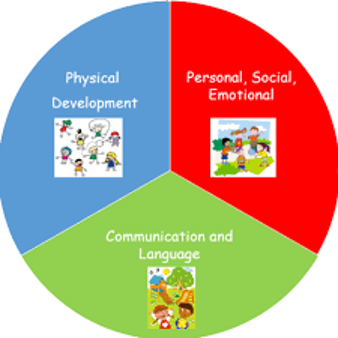
4 Specific areas of learning:
- Literacy (reading and writing)
- Mathematics (numbers and shape, space and measure)
- Understanding the world (people and communities, the world and technology)
- Expressive arts and design (exploring and using media and materials and being imaginative)
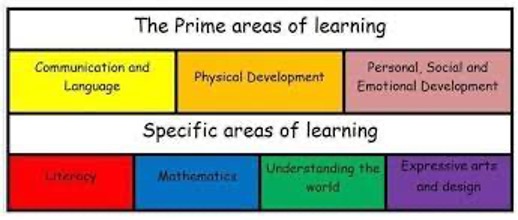
None of the areas can be delivered in isolation from the others. They are equally important and depend upon each other. All areas are delivered through a balance of adult led and child- initiated activities.
Through play and practical experiences, children learn about the world and their place in it. Students learn through opportunities provided through continuous provision set up for key areas of learning in the classroom. We set realistic yet challenging expectations that meet the needs of our children. We achieve this by planning to meet the needs of all our children in Tiny Sparkles and Champions.
Personal, Social and Emotional Development
At Al Karamah School and Training Institute fosters and develops relationships between home and school. Children are encouraged to share, take turns and co-operate with others. They are encouraged to be independent and make choices for themselves. Children are exposed to opportunities to study Arabic literacy and communication, Islamic and the Quran and Social studies to understand that they are Emirate and Children of Zayed which will enable them to build their Emirate Identity. Students understand the world through these subjects. Following best practice guidelines, students within EYFS are learning in the following ways: songs, exploring artefacts, through play, arts and crafts and continuous provision.
Physical Development
Children are given opportunities to move to music, use equipment, develop, and practise their fine and gross motor skills. They develop an increasing understanding of how their body works, what is needed to be healthy and how to take care of themselves.
Communication and Language
This covers all aspects of language development and provides the foundation for literacy skills. Children are encouraged and supported to develop competence in speaking and listening, being able to pay careful attention to what is being done and responding appropriately. We aim to extend and enrich the children’s vocabulary through story time, rhymes, role-play, group discussions and a language rich environment.
Children are encouraged to share their own experiences through speaking and acting out events in imaginative play and talking about their own ideas. They are encouraged to take part in class activities such as participating in music sessions, working with puppets, saying rhymes and singing songs together.
Literacy
We have a variety of resources for the children to use to help them develop early literacy skills. Children are encouraged to use the mark-making areas indoors and outdoors independently, but they also take part in teacher-led activities. These activities include whole class shared reading, phonics sessions and small group guided reading and writing. To support the teaching of phonics, reading and emergent writing, we use the Little Wandle/Letters and Sounds programme. The pre-writing work encourages pencil control and clear letter formation.
Children can independently develop their writing skills in accordance with their age, ability and competence. We encourage children to treat books and other resources with respect and they are given many opportunities to enjoy books by themselves and with their peers and to listen to stories read by adults.
Mathematics
We aim for children to achieve mathematical understanding and a firm foundation for numeracy through practical activities and using and understanding language in the development of simple mathematical ideas. Pre-number work is covered through nursery rhymes and number activities complementing learning achieved at home. Children are given the opportunity to learn about numbers, shape, space, position, pattern and measurement. Towards the end of the Foundation stage children start learning to tell the time and are given opportunities to learn about money and simple calculations. We use White Rose Maths which is a problem-solving approach focused on children’s exploration of mathematical concepts through problem solving using the concrete, pictorial, abstract approach. This supports children to use physical resources and picture representations in order to develop a secure knowledge of key mathematical concepts that can then be applied to solve many problems.
Understanding the World
All children are given opportunities to solve problems, investigate, make decisions and experiment. They will learn about living things, their environment, the world around them and the people who are important in their lives. Children also have opportunities to develop computing skills working with and using modern technology.
Expressive arts and design
We provide opportunities for all children to explore and share their thoughts, ideas and feelings through a variety of art, design, technology, music, drama, movement, dance and imaginative play activities.
Children are given opportunities to make paintings, drawings, collages, models and use musical instruments. Children also learn new songs and rhymes and enjoy singing them with each other.
All aspects of learning are supported by the therapy team comprising Educational Psychology, Speech and language, Physiotherapy, Behaviour and Occupational therapy.
Implementation
Active Learning through Play
At Al Karamah School and Training Institute we recognize that young children learn best when they are active. We understand that active learning involves other people, objects, ideas and events that engage and involve children for sustained periods. Therefore, we believe that Early Years education should be as practical as possible and our EYFS setting has an ethos of learning through play.
We recognize the importance of children’s play. It is an essential and rich part of their learning process, supporting them in all areas of development. Play is a powerful motivator encouraging children to be creative and to develop their ideas, understanding and language. It can provide multiple ways for children to learn a variety of different skills and concepts.
In the EYFS settings at Al Karamah School and Training Institute, practitioners provide both structured play opportunities inside and outside. Through planned continuous provision activities designed to engage children in practical, first- hand experiences which will support children to discover, explore, investigate, develop their personal interests and areas of curiosity, and help to make sense of the world around them as they begin to understand specific concepts. Play opportunities are also set up to provide children with opportunities to apply newly acquired knowledge, demonstrating their skills and level of understanding.
Home-school links
- A meeting is held at the beginning of the year with all Information is shared and routines are explained through the annual review process.
- 3 parent consultations are held throughout the
- Parents/guardians can arrange informal meetings with the class teacher as and when
- Class Dojo is used to ensure effective communication between home and school.
Impact
The ultimate test of the impact of EYFS approaches is in whether the students are making progress.
The EYFS statement of intent will ensure that there is a consistent approach to teaching and learning and students' needs are met. To determine this, we regularly observe and assess our students.
Assessment and Record Keeping
Students in EYFS are assessed termly in seven areas of learning- communication and language, personal, social and emotional development, physical development, literacy, mathematics, understanding the world and expressive art and design.
Ongoing assessment is an essential aspect of the effective running of the EYFS classes at Al Karamah School and Training Institute. Regular, planned and focused assessments are made of children’s learning and individual needs. The main EYFS assessment method is through practitioners’ observations of children in different teaching and learning contexts, including both adult focused activities and child-initiated play. The wealth of knowledge that parents provide about their child is highly valued and is an integral part of building a picture of their child’s learning and development. All practitioners are involved in observing children.
Other methods of assessing children in the EYFS setting include engaging alongside children in their play, annotation of children’s written work and talking with children about their task or play. Samples of children’s work are gathered, along with photographic evidence and observations. Children’s learning priorities are identified, and relevant learning opportunities are planned to support children to make the next steps and progress.
التربية الاسلامية
ندرس في مدرسة الكرامة التربية الاسلامية وفقا لمنهاج وزارة التربية والتعليم ولكننا نقوم بتبسيط الدروس وتدريسها باستخدام استراتيجيات تلائم الطلبة ذوي التوحد لتلبي احتياجاتهم التعليمية والحسية .
يركز المعلمون في هذا القسم على غرس قيم الإنسان المسلم في أذهان طلابنا وتعليمهم كيفية الوضوء و الصلاة وأخذهم للصلاة في مسجد المدرسة مع متابعتهم اليومية و توجيههم للصلاة بشكل صحيح. ويتعلم الطلبة ان الرسول صلى الله عليه وسلم هو أسوتنا وقدوتنا عند تعاملنا مع الاخرين من خلال تبيان سنته ومثال ذلك احترامنا للكبير وعطفنا على الصغير وأن نحب الخير للجميع وأن نعمل الأعمال الصالحة التي تقربنا إلى الله.
ونركز على قراءة القرآن والخشوع عند سماعه وحفظه وننتقي السور التي تلائم مستويات وقدرات الطلبة . ويتعلم الطلاب كذلك الاحاديث الشريفة وتعاليم دينهم الحنيف بشكل مبسط كقراءة أذكار الصباح ودعاء الطعام . اما بالنسبة للعقيدة الاسلامية , يحاول المعلمون تبسيط المفاهيم وتدريسها بشكل سهل وباساليب تسهل على طلبة التوحد استيعاب المفاهيم التجريدية.
يستخدم المدرسون المرئيات واساليب تركيز التوحد وانبرنت والصور واستراتيجيات قسم العلاج الوظيفي والنطق واللغة ومعالجة السلوك لمساعدة الطلبة على فهم المادة . يدمج المدرسون مهارات القراءة والكتابة والمحادثة والاستماع في تعليم التربية الاسلامية . ويركز كل معلم على الاسلوب الرئيسي في التعلم- في المدرسة " انا اعمل , نحن نعمل , انت تعمل " . يشارك الطلبة في مسابقات القران الكريم وقد حاز طلبتنا على الجوائز على مر السنين . وتحتفل المدرسة بالمناسبات الدينية كالمولد النبوي وعيد الفطر وعيد الاضحى من اجل بناء شخصية الطالب التي تتميز بقيم المواطن الاماراتي المسلم .
Al Karamah School and Training Institute Mathematics Curriculum Statement of Intent
Aligned with the Al Karamah Vision and Mission, our mathematics curriculum is carefully crafted to provide the highest quality education and care in a safe and positive environment. With a commitment to enabling each young person to achieve their potential, our curriculum creates a world of possibilities through enriching, nurturing, and high-quality education.

Al Karamah Vision
To strive to provide the highest quality education and care in a safe and positive environment that enables esch young person to achieve their potential
Al Karamah Mission:
Al Karamah School is creating a world of possibilities, supporting student achievement, enjoyment, and well-being through enriching, nurturing, and high-quality education.
Curriculum Implementation:
Our curriculum not only reflects the Al Karamah Vision and Mission but also integrates the ASPRIS philosophy. Grounded in pedagogical methods advocated by educators such as Barak Rosenshine and Tom Sherrington, our mathematics curriculum is designed to inspire and motivate students to excel whatever their starting point through our curriculum model UAE (Understand, Adapt and Exceed).
Subject Delivery:
Our mathematics sessions are delivered daily, five times a week, and last 30 minutes, the instructional approach is meticulously structured, as seen in the instructional process in to three key phases. These sessions are enhanced by daily activities that aim to reinforce mathematical concepts, such as 1 Minute Maths, mental maths opportunities and cross curricular links to other parts of the curriculum. Developing mental fluency and automaticity enables our students to instantly recall number facts which will support students in approaching more complex mathematical questions.
Within Tiny Sparkles and Little Champions phases, mathematics is also addressed through continuous provision planning. Maths areas within classes support the teaching of Maths and link to learning outlined in the planning. In our Training Institute, our students are preparing for adulthood and continue to develop their understanding of maths applying it practically through training and work experience.
The Instructional Process:
At Al Karamah School and Training Institute, the instructional process is split in to three parts: “I do, We do, and You do.”
I do: The initial stage involves direct instruction, where the teacher takes the lead in presenting new concepts and demonstrating problem-solving techniques. This phase allows students to observe and understand the processes involved.
We do: Moving to the collaborative phase, known as "We do," the teacher engages the students in shared and modeled practice. Together, they work through examples, emphasizing interaction and participation. This stage facilitates a guided understanding of the concepts introduced.
You do: The final phase, "You do," encourages independent practice and mastery. Students apply what they've learned to solve problems on their own, demonstrating a level of proficiency and understanding. This phase promotes self-directed learning and reinforces the concepts covered in the lesson.
This structured approach ensures a comprehensive learning experience, with a focus on direct instruction, shared practice, and independent application for mastery.
Long-Term Planning (White Rose Maths):
Our curriculum incorporates the long-term plans outlined by White Rose Maths. These plans ensure a comprehensive and progressive approach to mathematical concepts, such as number and algebra, geometry, statistics and finances; aligning with national curriculum objectives for England. Our aim is to provide students with a strong foundation and a deep understanding of mathematical principles over their educational journey and to prepare them for adulthood.
Year 1 |
Year 2 |
|
|
|
Year 3 |
Year 4 |
|
|
|
Year 5 |
Year 6 |
|
|
|
Year 7 |
Year 8 |
|
|
|
Year 9 |
Year 10 |
|
|
|
Year 11 |
|
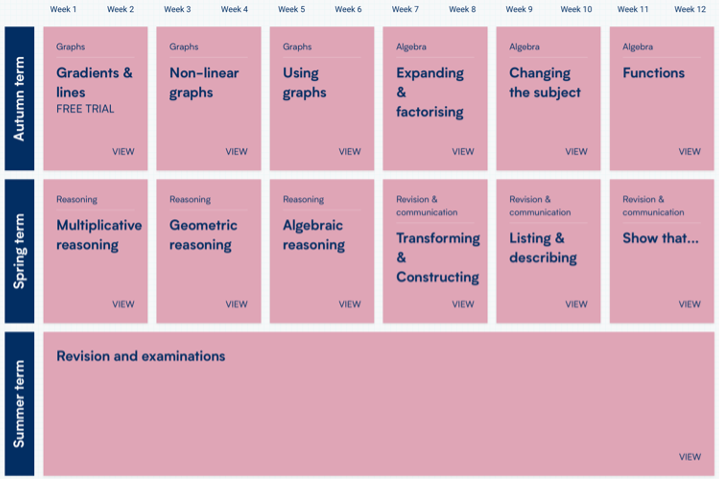 |
Planning Adaptations:
Daily planning from White Rose Mathematics is adapted using visuals consistent across Al Karamah School and Training Institute.
Impact:
The ultimate test of the impact of the curriculum is in whether the students know what you want them to know, and what you think they should know. This has been carefully mapped against the core concepts for mathematics. To determine this, we check and monitor children’s learning, providing teachers and students with information about progress and analysis of deliberate retrieval practice.
Assessment techniques such as checking for understanding, retrieval practice, and depth of knowledge assessments drive the impact of our curriculum. Teachers use assessment formatively through questioning, board work, use of apparatus and worksheets on a daily and weekly basis. Along with summative termly assessments, teachers ensure continuous monitoring of students' learning in order to better meet their needs. The impact on learning will be monitored by mathematics leaders through termly summative assessments from Y1 onwards and by termly teacher assessed learning outcomes in Early Years through the Branch Map.
At Al Karamah School, our mathematics curriculum is a testament to our commitment to creating a positive, supportive, and enriching environment. Through the integration of our vision, mission and the long-term plans from White Rose Maths, we inspire and empower students to fulfill their potential, fostering a lifelong love for learning and a strong foundation in mathematical core concepts: number, algebra, measurement, geometry, data and reasoning. Our aim is to equip students for life.
Al Karamah School and Training Institute Music Curriculum Statement of Intent
Aligned with the Al Karamah Vision and Mission, our music curriculum is meticulously crafted to provide the highest quality education and care in a safe and positive environment, reflecting the AKS Curriculum Statement of Intent to ensure every opportunity is seized for our students' growth. Our children live in a world where they require skills, qualifications, flexibility, emotional intelligence, and expertise to thrive. They need a supportive network of relationships to excel and early development of vocabulary skills to succeed. Our curriculum aims to inspire students to enjoy and understand the world through music, equipping them with the ambition, skills, and confidence to thrive in a communication-rich, interconnected world. It fosters collaborative skills, self-expression, and cultural awareness while enriching their language and communication abilities. Our music curriculum is a testament to our commitment to providing a positive, supportive, and enriching environment, integrating our vision, mission, and the AKS Curriculum Statement of Intent to inspire and empower students, fostering a lifelong love for music and a strong foundation in musical core concepts to equip them for life.

Al Karamah Vision
To strive to provide the highest quality education and care in a safe and positive environment that enables esch young person to achieve their potential
Al Karamah Mission:
Al Karamah School is creating a world of possibilities, supporting student achievement, enjoyment, and well-being through enriching, nurturing, and high-quality education.
Curriculum Implementation
Incorporating an AKS Implementation informed by cognitive science research from Rosenshine, , we enhance classroom practice through tailored pedagogy and CPD. Integrating core music concepts, our curriculum ensures structured progression and mastery opportunities appropriate to the needs of individual students
Subject Delivery
Music is taught as a skills lesson on a weekly basis, tailored specifically for our children. There is a regular music focus in the thematic content, linked to the theme being taught and culminating in a showcase of content. The music lessons are carefully designed to enhance speech and language development, improve motor skills, promote calmness and confidence, and provide opportunities for playing instruments. Each session is structured to accommodate the unique needs of our children, offering a mixture of discrete activities to enable focused skill development. Vocabulary is continually developed using sentence stems providing a supportive environment for language learning alongside developing musical skills. Thematic lessons integrate music into themed weeks, providing students with an inclusive environment to explore language, knowledge, and musical expression.
Events
As an outcome of the subject delivery, our termly events and student performances have become a highlight of our educational programme. These events provide a platform for students to showcase the skills and knowledge they have acquired through their tailored weekly music lessons. The performances are not only a celebration of their musical abilities but also an opportunity for them to demonstrate their enhanced speech and language skills, improved motor coordination, and boosted confidence. Each performance is meticulously planned to reflect the thematic content integrated into their lessons, offering a cohesive and engaging experience for both the students and the audience. These events foster a sense of accomplishment and pride among the students, encouraging them to continue exploring and developing their talents in a supportive and inclusive environment.
The Instructional Process
At Al Karamah School and Training Institute, the instructional process is split in to three parts: “I do, We do, and You do.”
I do: The initial stage involves direct instruction, where the teacher takes the lead in presenting new concepts and demonstrating problem-solving techniques. This phase allows students to observe and understand the processes involved.
We do: Moving to the collaborative phase, known as "We do," the teacher engages the students in shared and modeled practice. Together, they work through examples, emphasizing interaction and participation. This stage facilitates a guided understanding of the concepts introduced.
You do: The final phase, "You do," encourages independent practice and mastery. Students apply what they've learned to solve problems on their own, demonstrating a level of proficiency and understanding. This phase promotes self-directed learning and reinforces the concepts covered in the lesson.
This structured approach ensures a comprehensive learning experience, with a focus on direct instruction, shared practice, and independent application for mastery.
Long-Term Planning
Our music curriculum integrates the strategic framework. These plans ensure a comprehensive and progressive approach to musical concepts, such as rhythm, melody, harmony, music theory, and performance; aligning with the national curriculum objectives for England. Our aim is to provide students with a strong foundation and a deep understanding of musical principles throughout their educational journey, preparing them for a lifelong appreciation and engagement with music.
Planning Adaptation
Daily music planning at Al Karamah School is adapted using consistent visual aids to enhance understanding and engagement across all grade levels.
Impact
The ultimate test of the impact of the music curriculum lies in whether the students grasp the essential musical concepts and skills we aim to impart. This has been carefully mapped against core music competencies. To determine this, we continuously monitor and assess children’s musical learning, providing both teachers and students with insights into progress and the effectiveness of retrieval practice.
Assessment techniques such as checking for understanding, retrieval practice, and depth of knowledge assessments are integral to measuring the impact of our music curriculum. We use formative assessments through practising, recalling information from memory, playing instruments from memory, and music performances on the stage, as well as through questioning, interactive activities, instrumental practice, and worksheets on a weekly basis. Combined with summative termly assessments, this ensures continuous monitoring of students' musical development to better meet their needs.
At Al Karamah School, our music curriculum reflects our dedication to creating a positive, supportive, and enriching environment. By integrating our vision, mission, and long-term plans, we inspire and empower students to fulfill their potential, fostering a lifelong appreciation for music and a solid foundation in musical core concepts: rhythm, melody, harmony, dynamics, form, and expression. Our aim is to equip students for life through the joy and discipline of music.
Al Karamah School and Training Institute Phonics Statement of Intent
The context of our school
Al Karamah School and Training Institute is a special school that caters for autistic learners. It is essential that our approach to teaching phonics and reading is accessible to all learners, regardless of background.
Intent
The AKS/AKTI Curriculum Statement of Intent has been carefully considered for each curriculum area to ensure the content designed meets our vison and mission at every opportunity.

Al Karamah Vision
To strive to provide the highest quality education and care in a safe and positive environment that enables esch young person to achieve their potential
Al Karamah Mission:
Al Karamah School is creating a world of possibilities, supporting student achievement, enjoyment, and well-being through enriching, nurturing, and high-quality education.
AL KARAMAH VISION
To provide the highest quality education and care in a safe and positive environment that enables each young person to achieve their potential.
AL KARAMAH MISSION
Al Karamah School is creating a world of possibilities, supporting student achievement, enjoyment, and wellbeing through enriching, nurturing, and high-quality education.
Phonics (reading and spelling)
At Al Karamah School and Training Institute our aim is for all our students to become fluent readers and writers. This is why we teach reading through Little Wandle Letters and Sounds Revised, which is a systematic and synthetic phonics programme. We follow the Little Wandle Letters and Sounds Revised progression, which ensures children build on their growing knowledge of the alphabetic code, mastering phonics to read and spell as they move through school.
Once students are developmentally ready, they move onto Little Wandle phonics to further enhance their skills and understanding of phonics. Whilst phonics sessions are taught formally as part of our daily Communication and Literacy sessions, students practise decoding words throughout the school day.
Language Comprehension
Alongside formal synthetic phonics, our students develop language comprehension through reading sessions in class. Reading sessions establish background knowledge, key vocabulary and understanding of literacy concepts and genres. Our students are enabled to understand the structure of language and apply verbal reasoning.
Implementation
- We provide a balance of child-led and adult-led experiences for all children that meet the curriculum expectations for ‘Communication and Language’ and ‘Literacy’. These include:
- sharing high-quality stories and poems
- learning a range of nursery rhymes and action rhymes
- activities that develop focused listening and attention, including oral blending
- attention to high-quality language.
- We ensure children are well prepared to begin learning grapheme-phoneme correspondences (GPCs) and blending.
- We teach phonics for 40 minutes a day. These sessions can be split into smaller phonics sessions or incorporate Continuous Provision. Length and content of the lessons should be adapted based on the needs of the students. Each Friday, we review the week’s teaching to help children become fluent readers.
- We follow the Little Wandle Letters and Sounds Revised expectations of progress:
- Children are taught to read and spell words using Phase 2 and 3 GPCs, and words with adjacent consonants (Phase 4) with fluency and accuracy.
- Children move on to review Phases 3 and 4 and are taught to read and spell words using Phase 5 GPCs with fluency and accuracy.
- We use SEND resources with students who require adaptations and smaller steps of learning
Teaching reading
- We teach children to read through reading practice sessions ideally three times a week, however this can be adapted to meet the needs of the students. These:
- are taught by a trained adult to individuals and small groups.
- use books matched to the children’s secure phonic knowledge using the Little Wandle Letters and Sounds Revised assessments and book matching grids.
- are monitored by the class teacher, who rotates and works with each group or individual on a regular basis.
- Each reading practice session has a clear focus, so that the demands of the session do not overload the children’s working memory. The reading practice sessions have been designed to focus on three key reading skills:
- decoding
- prosody: teaching children to read with understanding and expression
- comprehension: teaching children to understand the text.
Ensuring consistency and pace of progress
- Every teacher in our school has been trained to teach reading, so we have the same expectations of progress. We all use the same language, routines and resources to teach children to read so that we lower children’s cognitive load.
- Weekly content grids map each element of new learning to each day, week and term for the duration of the programme.
- Lesson templates, Prompt cards and ‘How to’ videos ensure teachers all have a consistent approach and structure for each lesson.
- The Reading Leader and SLT use the Audit and Prompt cards to regularly monitor and observe teaching; they use the summative data to identify children who need additional support and gaps in learning.
Ensuring reading for pleasure
‘Reading for pleasure is the single most important indicator of a child’s success.’ (OECD 2002)
We value reading for pleasure highly and work hard as a school to grow our Reading for Pleasure pedagogy.
- We read to children every day. We choose these books carefully as we want children to experience a wide range of books, including books that reflect the children at Al Karamah School and Training Institute and our local community as well as books that open windows into other worlds and cultures.
- The school library is made available for classes to use at protected times.
Impact
Assessment
Assessment is used to monitor progress and to identify any child needing additional support as soon as they need it.
- Assessment for learning is used:
- daily within class to identify children needing support
- weekly in the Review lesson to assess gaps, address these immediately and secure fluency of GPCs, words and spellings.
- Summative assessment is used:
- every six weeks to assess progress, to identify gaps in learning that need to be addressed, to identify any children needing additional support and to plan the support that they need.
- by SLT and scrutinised through the Little Wandle Letters and Sounds Revised assessment tracker, to narrow attainment gaps between different groups of children and so that any additional support for teachers can be put into place.
- Fluency assessments measure children’s accuracy and reading speed in short one-minute assessments. They are used:
- when children are reading the Phase 5 set 3, 4 and 5 books
- to assess when children are ready to exit their programme. Students will read the final fluency assessment at 60–70+ words per minute. At these levels, children should have sufficient fluency to tackle any book at age-related expectations. After exiting their programme, children do not need to read any more fully decodable books.
- SEND Assessment is used with students who require smaller steps of learning at the end of a cycle of teaching
- The Placement Assessment is used:
- with any child new to the school to quickly identify any gaps in their phonic knowledge and/or decide which phase of phonics should be their starting point
- The Placement Assessment is not needed where students are starting from the beginning
Reading at Al Karamah School and Training Institute School and Training Institute
Intent
The AKS/AKTI Curriculum Statement of Intent has been carefully considered for each curriculum area to ensure the content designed meets our vison and mission at every opportunity.

Al Karamah Vision
To strive to provide the highest quality education and care in a safe and positive environment that enables esch young person to achieve their potential
Al Karamah Mission:
Al Karamah School is creating a world of possibilities, supporting student achievement, enjoyment, and well-being through enriching, nurturing, and high-quality education
Our curriculum has the child at the centre of everything we do. The reading curriculum specifically meets the AKS/AKTI statement of intent by focusing on the following areas:
Consistent and systematic approach to teaching phonics and reading
We know that reading has many benefits. It enables students to access and learn about the world. It improves students’ vocabulary and communication. It develops students’ imagination and creativity. It helps students to build relationships. It improves students’ self-esteem.
As a school, we ensure that all our pupils experience success in reading, in a personalised way, whatever their starting point through our curriculum model UAE (Understand, Adapt and Exceed):
Pre-Reading and Writing Skills
To ensure our pupils have the skills to access formal synthetic phonics, our curriculum provides the opportunity to develop pre-reading and writing skills. This can include:
- Building and developing attention
- Turn taking
- Learning about sound in everyday contexts
- Extended and embedded vocabulary and story language
- Recognising text and images
- Handling books
- Developing fine and gross motor skills
- Instilling a love of and interest in books.
Synthetic Phonics
Once students are developmentally ready, they move onto Little Wandle phonics to further enhance their skills and understanding of phonics. Whilst phonics sessions are taught formally as part of our daily Communication and Literacy sessions, students practise decoding words throughout the school day.
Language Comprehension
Alongside formal synthetic phonics, our students develop language comprehension through reading sessions in class. Reading sessions establish background knowledge, key vocabulary and understanding of literacy concepts and genres. Our students are enabled to understand the structure of language and apply verbal reasoning.
A Text Rich Approach
Reading continues to be taught throughout the curriculum via a text rich topic based approach. Our book-based curriculum not only develops reading but provides a meaningful context for writing. Students are encouraged to explore the contexts, structure and features, thematic content, and big ideas in texts. Daily reading slots enhance students' independence and love of reading.
Reading Spaces
To promote a culture of reading, Al Karamah School and Training Institute has designated spaces such as our library, continuous provision in primary and reading spaces within classrooms or clusters. The school library is made available for all classes to use at protected times.
Autism Practice and Communication Needs
Alongside our extensive reading offer, we utilise the following approaches to support our students to communicate and access learning.
- Attention Autism
- SCERTS model
- Augmentative and alternative communication
- Makaton
- Visual supports using Widgit/in Print
- Sensory stories
- Blank’s levels of questioning
- Colourful semantics
Implementation
All students’ previous literacy experiences are different as they do not start Al Karamah School and Training Institute school with similar levels of exposure to reading. Students with autism may struggle with verbal instruction or the decoding of written text, but thrive with instruction that incorporates visual accompaniment, particularly visuals that correspond seamlessly with the text they are engaging. Some students with autism have different stages of communication needs and we work closely with the speech and language department to understand the stages individual students are at using SCERTS.
The reading environment at Al Karamah School and Training Institute is organized to support reading instruction, with lessons following a predictable format so the students are comfortable with the learning programme and know what to expect. To ensure our intent transfers into everyday classroom practice we use our autism knowledge and practices alongside using Rosenshine’s Principles of Instruction. The curriculum is implemented effectively through a set of core concepts, developed for each curriculum area. We take the ‘I do, we do, you do' approach as a teaching model.
- I do: the teacher models or demonstrates the skill or concept.
- We do: The teacher and students practice the skill or concept together with scaffolding and guidance.
- You do: The students apply the skill or concept on their own.
The core concepts of reading
|
Core Concepts in Reading | |
|---|---|
|
Phonics Fast access to visual information in print is of the greatest importance in literacy learning. With effective, systematic phonics instruction children will develop acute phonological and phonemic awareness, understanding that the sounds of spoken language work together to make words. Foundational learning in phonological awareness, a metacognitive skill, will underpin competent reading at all ages. Students will learn how to look at print, what to look for in print, how to link what they hear and see in print and how to synthesise sounds together to read words. All students will have a strong and robust knowledge of sounds, letters, words and how they work. They will use their phonic knowledge as the bridge towards automatic word reading and learn to analyse words efficiently, flexibly and in a variety of ways. |
Phrasing and fluency Reading fluency is the outcome of a reader’s integration of strategic actions, automatic word-reading and the ability to attend to prosodic features of language. This includes rhythm, pace, expression, pitch, stress, juncture and sensitivity to syntax. All of this is guided by the reader’s ongoing construction of meaning. Phrasing in fluent reading is the ability to group words together as in natural language, pausing appropriately between phrases, clauses and sentences. We know that factors that contribute to this are the students own oral language, prior knowledge, knowledge about books and print and flexibility in responding to the demands of the text. By exploiting the power of story, rhyme, drama, song and dialogic reading, all students will learn to read in a phrased and fluent way, they will sound good and be a pleasure to listen to. |
|
Print, text structure, layout and organisation concepts Explicit teaching of text structure demonstrates an improved ability in comprehension of expository and narrative texts. Text structures are infused at every step of reading comprehension instruction, beginning with the introduction of the lesson, previewing of text, selecting important ideas, writing a main idea, generating inferences, and monitoring comprehension. They link closely to the core concept of comprehension. |
Personal reading journey Learning to read is complex and the route to active reading is challenging. As each student embarks on their personal journey to becoming literate, we will support their varied and broad experiences by providing a strong foundation of spoken language, rich shared reading for pleasurable experiences, high-quality texts rich in vocabulary and supportive structures to develop reading and decodable texts to support word-reading. Their experiences will change over time and as each student learns to coordinate phonic, semantic and syntactic cues there will be a shift in focus to reading to learn. Our broad and rich reading curriculum will influence and motivate reading for pleasure, provide many opportunities to engage with a wide variety of books, and empower our students to respond to texts, articulate their own opinions and questions as well as select and discard texts based on their enjoyment and emotional satisfaction. |
|
Comprehension The goal of reading is being able to understand text, a task of immense complexity. As soon as reading instruction is underway, all students will be taught to integrate information from a range of cue sources including phonics, semantic information, and language. Over time, with practice, reading becomes automatic and that automaticity frees up cognitive space to interpret texts and aids greater understanding and insights. Reading comprehension strategies involve the teaching of explicit approaches and techniques a student can use to improve their comprehension of written text. |
|
The curriculum is carefully designed to balance these core concepts using a variety of approaches to the teaching and practice of reading.
Subject delivery
|
Direct and daily 30 mins |
Indirect and daily 15 mins |
Direct and targeted 15 mins |
|---|---|---|
|
Teaching of synthetic phonics Explicit strategy instruction focusing on decoding and comprehension. Reading aloud a wide range of quality literature Explicit vocabulary development |
Wider independent reading Vocabulary development weaved within the curriculum. Engaging with literature and academic text specific to all curriculum areas Text navigation, structure and purpose within all curriculum areas |
High-quality, evidence based, structured interventions that support pupils who are struggling with reading and accelerate learning to narrow the attainment gap |
Phonics – Little Wandle
At Al Karamah School and Training Institute School, we believe that all our students can become fluent readers and writers. We start teaching phonics with students that are at the beginning of their reading journey and follow the Little Wandle Letters and Sounds Revised progression, which ensures students build on their growing knowledge of the alphabetic code, mastering phonics to read and spell as they move through school.
As a result, our students will be able to tackle any unfamiliar words as they read. At Al Karamah School and Training Institute, we also model the application of the alphabetic code through phonics in shared reading and writing, both inside and outside of the phonics lesson and across the curriculum. We have a strong focus on language development for our children because we know that speaking and listening are crucial skills for reading and writing in all subjects.
Reading aloud
We value a broad, balanced and reading rich curriculum that includes reading with, reading by and reading to students. By protecting time every day, to read aloud to our students they will have the opportunity to hear and respond to great stories written by some of the most highly acclaimed literacy authors including local and culturally appropriate texts.
For younger students, a range of high-quality picture books will be read several times so children can join in with repetitive refrains, rhythm, and rhyme. The journey will then continue with short novels moving into longer novels for older students.
Independent Reading
Students are encouraged to read independently and read for pleasure; reading is a skill that is not just about instruction but practice. Reading practice serves a number of purposes. It enables students to apply the skills and strategies that are taught; it provides opportunities to check student learning and identify weaknesses and it draws students into the world of “real” reading – a world in which people learn from and enjoy books.
Whole class comprehension
Some students with autism often have strong reading skills but find it challenging to comprehend what they have read. Difficulties in reading comprehension may be due to the lack in social communication skills as well as the theory of mind (understanding others’ mental states), which are both associated with autism. These challenges may impact the ability to sequence, visualize, predict, and infer information from a text. At Al Karamah School and Training Institute school we use many different strategies to support comprehension, such as sequencing, visualising, predicting, and inferencing.
Impact
The ultimate test of the impact of the reading strategy is in whether the students know what you want them to know, and what you think they should know.
The reading strategy will ensure that there is a consistent approach to teaching and learning, students are exposed to reading every day with appropriate texts, students develop their reading comprehension, and any reading gaps can be addressed.
To determine this, we check and monitor students’ learning, providing teachers and students with information about progress and analysis of deliberate retrieval practice. We need to be able to fluidly use ‘checking for understanding’ techniques in the moment as well as being able to know what has been learnt and retained over time and the depth of that learning.
Assessment
Assessment is used to monitor progress and to identify any child needing additional support as soon as they need it.
- Assessment for learning is used:
- daily within class to identify students needing keep-up support
- weekly in the review lesson to assess gaps, address these immediately and secure fluency of GPCs, words and spellings.
- Summative assessment:
- every half term to assess progress, to identify gaps in learning that need to be addressed, to identify any students needing additional support and to plan the keep-up support that they need.
- by SLT and scrutinised through the Little Wandle Letters and Sounds Revised assessment tracker, to narrow attainment gaps between different groups of students and so that any additional support for teachers can be put into place.
- Fluency assessments measure students’ accuracy and reading speed in short one-minute assessments. They are used:
- when students are reading the Phase 5 set 3, 4 and 5 books
- to assess when students are ready to exit their programme. This is when they read the final fluency assessment at 60–70+ words per minute. Older students can exit the programme when they read the final fluency assessment at 90+ words per minute.
Science in the Al Karamah School and Training Institute Curriculum Statement of Intent
Aligned with the Al Karamah Vision and Mission, our mathematics curriculum is carefully crafted to provide the highest quality education and care in a safe and positive environment. With a commitment to enabling each young person to achieve their potential, our curriculum creates a world of possibilities through enriching, nurturing, and high-quality education.

Al Karamah Vision
To strive to provide the highest quality education and care in a safe and positive environment that enables esch young person to achieve their potential
Al Karamah Mission:
Al Karamah School is creating a world of possibilities, supporting student achievement, enjoyment, and well-being through enriching, nurturing, and high-quality education.
Intent
The Al Karamah School (AKS) and Al Karamah Training Institute (AKTI) curriculum statement of intent has been adapted for science to ensure that the content designed meets our vision and mission at every opportunity.
At Al Karamah School, we recognise the importance of science in every aspect of daily life. As an area of learning, science is concerned with increasing all students’ knowledge and understanding of our world, and with developing skills associated with science as a process of enquiry. It develops the natural curiosity of each student, encourages respect for living organisms and the physical environment and provides opportunities for critical evaluation of evidence.
We ensure that the ‘working scientifically’ skills are developed and extended throughout our student’s time at the school so that they can apply their knowledge of science when using equipment, conducting experiments, and confidently explaining scientific concepts.
Working Scientifically
White Rose Science is used to support the teaching and learning of science at AKS and AKTI. It incorporates a small step approach to science with practical experiences of working scientifically integral to the resources and lessons. We aim to inspire and excite children with a range of activities so that they view scientific learning positively.
During their time at the school, students will carry out investigations which involve different types of enquiries: comparative / fair testing, research, observation over time, pattern seeking, identifying, grouping, and classifying and problem solving.
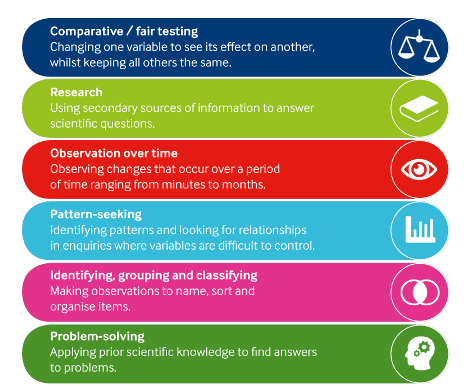
There are seven science skills which students develop over time: asking questions, making predictions, setting up tests, observing and measuring, recording data, interpreting, and communicating results and evaluating. Further development of these skills includes working scientifically, development of scientific thinking, experimental skills and investigations, analysis and evaluation, measurement, vocabulary, units, and symbols. We ensure that the working scientifically skills are developed and extended throughout a student’s time at the school so that they can apply their knowledge of science when using equipment, conducting experiments, and confidently explaining scientific concepts.
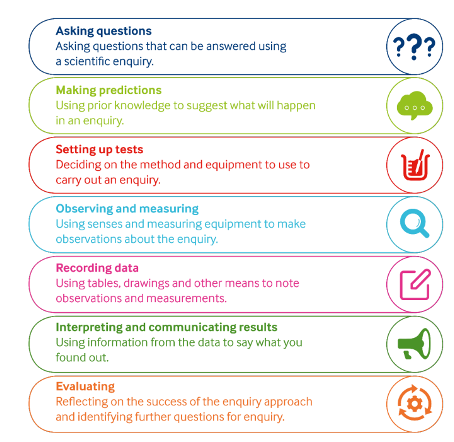
Implementation
The national curriculum programme of study for science describes a sequence of knowledge and concepts, processes, and methods. This sequence of knowledge and concepts is arranged as progressive blocks of key ideas in biology, chemistry, and physics, alongside a progression in the skills of working scientifically.
The conceptual ideas in biology, chemistry and physics build on each other and students need to develop a strong understanding of key knowledge and skills to support the learning in the next topic. The programme of study is set out year by year for every class, but each science topic is not covered in every year. It is therefore important that teachers and students know where each block fits into the overall sequence. The national curriculum statements have been edited into key theme statements.
The source of each key theme is identified by the year group and the programme of study topic heading. Some additional statements have been added to make important links between themes. AKS/AKTI use the White Rose science scheme to provide a structured and coherent programme of learning that builds progressively through each year. In our Early Years classes, science forms part of our hands on learning approaches through continuous provision. In Champions and Explorers classes, our science sessions are delivered twice per week and last 30 minutes, with students using the science lab for practical lessons. In AKTI, students take part in a hydroponics session once a week. In addition, other practical science related activities are covered in Preparation for Adulthood activities.
Consistent and systematic approach to teaching science
Students with autism may struggle with verbal instruction or the decoding of written text, but will flourish with instruction that incorporates visual accompaniment, particularly visuals that correspond seamlessly with the lesson they are engaging with. Class teachers therefore use clear and precise language when giving instructions or when explaining abstract concepts. They allow students to work in groups during practical activities to build their confidence and independence. Students are also given more time to process instructions and answer questions. Science models are used frequently and teaching assistants model tasks, use scaffolding and writing frames to demonstrate how text should be organised. Class teachers also use pictures, now and next boards and visual supports about changes in routines that may occur during a practical science lesson.
To ensure our intent transfers into everyday classroom practice we use our autism knowledge and practices alongside using Rosenshine’s Principles of Instruction. The curriculum is implemented effectively through a set of core concepts, developed for each curriculum area. We take the ‘I do, we do, you do' approach as a teaching model.
- I do: the teacher models or demonstrates the skill or concept.
- We do: The teacher and students practise the skill or concept together with scaffolding and guidance.
- You do: The students apply the skill or concept on their own.
We utilise the following approaches to support our students to communicate and access learning.
- Attention Autism.
- What’s in the box?
- What’s in my bucket?
- Augmentative and alternative communication.
- Visual supports using Widgit/in Print.
- Enquiry method.
- Problem solving.
- Questioning-allowing take up time for students.
- Use of science models.
- Hands on and sensory experiments.
Practical experiences of working scientifically are integral to the White Rose scheme. We aim to inspire and excite children with such activities so that they view scientific learning positively.
Impact
The ultimate test of the impact of the curriculum is in whether the students know what you want them to know, and what you think they should know. This has been carefully mapped against the core concepts for science and in the working scientifically progression chart.
To determine this, we check and monitor student’s learning, to inform future planning. We use ‘checking for understanding’ techniques in the moment as well as being able to know what has been learnt and retained over time and the depth of that learning:
- We use checking for understanding techniques through quizzes and questioning to ensure we are aware of all students’ learning during the lesson and adapt the pace as necessary.
- Retrieval practice is built in where most impactful to interrupt the forgetting curve and secure constructs in long term
- Depth of knowledge is then assessed through teacher assessment, quizzing and end of block assessment
Assessment
Formative assessment is used to ensure that students make progress with their subject knowledge and enquiry skills. AFL strategies are embedded in lessons, and they are consistently used to monitor progress and to identify additional student needs. These activities also help the class teacher to plan and adapt resources to meet the needs of all our students.
In science, experiments, questioning and formative assessment are used as a method of assessing students’ understanding at the end of a core concept to analyse the extent to which knowledge has been consolidated into long-term memory. Retrieval practice throughout the lessons also supports knowledge being embedded in long term memory. End of block assessments at the end of each module pull together the learning for the subject under the core concept areas to consolidate learning and to prepare children to make links to future learning in subsequent years.
المواد: الدراسات الاجتماعية والتربية الوطنية والسنع الإماراتي
ندرس في مدرسة الكرامة الدراسات الاجتماعية والتربية الوطنية ومادة السنع الاماراتي وفقا لمنهاج وزارة التربية والتعليم ولكننا نقوم بتبسيط الدروس وتدريسها حسب امكانيات ومهارات الطلبة وباستخدام استراتيجيات تلائم الطلبة ذوي التوحد لتلبي احتياجاتهم التعليمية والحسية هذا بالاضافة الى اننا نقوم باثراء المنهاج بالاحتفال بالمناسبات الوطنية وتعزيز قيم وتراث الامارات بانشطة لاصفية متنوعة من اجل تعزيز الهوية الوطنية وبناء الشخصية الامارتية.
في مادة الدراسات الاجتماعية يعزز الطالب هويته الوطنية وانتماءه للوطن من خلال التعرف على تاريخ دولتنا، حيث يتعرف الطالب على القادة المؤسسين الشيخ زايد بن سلطان والشيخ راشد بن سعيد – رحمهما الله - وكيف قام اتحاد دولة الإمارات في عام 1971 . بالإضافة إلى معرفة اسم كل إمارة من الإمارات السبع وما يميزها من معالم ومن هو الحاكم الحالي للإمارة. ويتعلم الطالب ألوان علم الإمارات ودلالاتها والتوزيع الصحيح للألوان. ويتعلم أيضًا حب الوطن والحفاظ عليه وحماية ممتلكاته العامة من خلال السلوكيات الصحيحة في المنزل والمدرسة والمرافق العامة. ويتعرف الطالب على الزي الرسمي للذكور والإناث في دولة الإمارات.يدرس الطلبة عن الصناعات الوطنية وعن الهيئات العاملة في الدولة . ويتعرف الطالب على مفهوم الخريطة وتحديدا خريطة دولة الإمارات وخريطة الخليج العربي. بالإضافة إلى التعرف على دول الخليج كل على حده والقاسم المشترك بين الدول الخليجية وما يميز كل دولة. ويتعرف الطالب على المسطحات المائية التي تطل عليها الإمارات والحدود البرية المشتركة مع دول الجوار (السعودية وعمان). ويتعلم الطالب عن المجموعة الشمسية والكواكب بشكل واسع، مع ذكر اسم كل كوكب وما يميزه وترتيبه بين الكواكب.
ويساهم القسم بالاحتفال بالمناسبات الوطنية والاجتماعية في دولة الإمارات (يوم العلم – يوم الشهيد – العيد الوطني – حق الليلة – يوم الطفل الإماراتي – والاحتفال بانجازات الامارات في مجال الفضاء ) حيث تساهم هذه الاحتفالات وما يرافقها من انشطة وفعاليات في تعزيز الهوية الوطنية.
تم تعزيز الآداب المتبعة في دولة الإمارات من خلال دروس السنع. والسنع هو مجموعة من القوانين والقواعد التي تحكم السلوكيات والآداب في تعاملات الأفراد مع الضيوف والأهل فيما بينهم و هذه العادات لا تنتقل بالرواية و السرد فقط إنما يستقيها و يتعلمها الفرد من البيئة المحيطة لذلك نحن في مدرسة الكرامة نُعلم الطلاب السنع الإماراتي في المجالس وفي صب القهوة وفي الضيافة الإماراتية بشكل تطبيقي وعملي من خلال تطبيقنا لسنع المجالس بداية من خلع النعلين وانتهاءً بكيفية الجلوس بشكل جيد و التزام الصمت عند حديث الكبار فيما بينهم وكيفية صب القهوة ابتداءً من مسك الدلة باليد اليسرى و انتهاءً عند هز الضيف للفنجان دلالة على اكتفائه من شرب القهوة. ويتعلم الطلاب ايضا عن آداب الاستئذان عند الدخول مثال على ذلك قول: هود بصوت مسموع وواضح وأن لا ندخل للمكان إلا عند سماعنا لكلمة هِدى من الجالسين في المكان وحرصنا على تعليمهم كيفية الترحيب بالضيف من خلال قول مرحبا ومرحبا الساع ونحن نحرص على تعليم السنع من خلال التطبيق العملي في المجلس المصغر في المدرسة. يستخدم مدرسو التربية الوطنية النمذجة والمرئيات واساليب تركيز التوحد والصور واستراتيجيات قسم المعالجين لمساعدة الطلبة على فهم المادة. تشكل مهارات القراءة والكتابة والمحادثة والاستماع جزءا مهما في تعليم المادة ايضا . ويركز كل معلم على الاسلوب الرئيسي في التعلم- في المدرسة " انا اتعلم , نحن نتعلم , انت تتعلم "


















